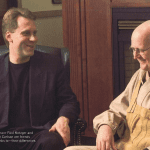Today is my birthday. As I look back upon my many years of life and look forward toward the future, I wish and hope that I will pursue life more fully with an open hand, not a clenched fist.
So often, I find people, myself included, trying to clutch onto life to squeeze and suck as much juice out of the turnip of existence before it is all gone. As a result, we often if not always miss life in the process. It is very difficult to enjoy and experience life as it comes to us if we are trying to seize and control it.
As I pondered this theme earlier today, I was taken back to my reflections on Buddhism and Christianity from Connecting Christ: How to Discuss Jesus in a World of Diverse Paths. There in my chapter on Buddhism, I spoke of my appreciation for the complexity and internal consistency of Buddhist philosophy. There are also numerous practical insights in Buddhism that bear upon serenity and the sanctity of all life. Further to what was said above, all too often I grasp onto things, living with clenched fists and clenched teeth. However, my Christian faith and Buddhism inform us that we should not grasp and clutch onto things in this life. Compassionate existence evades our grasp and slips through our teeth when we live with clenched fists and jaws. We need to live with open hands and palm to palm.
For all the profundity in Buddhism and Christianity, these two historical religious traditions approach the subject of grasping from very different frames of reference and with different ends in mind. For Buddhists, according to my dear friend and colleague Zen Buddhist Priest Abbot Kyogen Carlson, enlightenment involves ceasing to grasp after things, which have no permanence. Nothing has permanence, not even personhood. This is the negative side of enlightenment. The positive side of enlightenment is to engage in a non-grasping way. The Noble eightfold Path of Buddhism helps the follower move beyond grasping. My friend, Kyogen, models a non-grasping life beautifully in so many ways, so much so that he can engage me openly–an Evangelical Christian–palm to palm.
Perhaps I will reflect further upon this subject in future posts. For now, however, I wish to reflect upon historic Christianity’s call to pursue permanence through interpersonal communion and what that means for me today on my birthday. I conceive of the Christian faith in relational and interpersonal terms. Personhood understood interpersonally and not individualistically involves interpersonal communion. It involves sharing life, not seizing it, finding ourselves in laying down our lives for others rather than taking life from others, enjoying the moment rather than trying to lock it up and putting it on display as if it could last eternally. All too often, I try and make an eternity out of time rather than allow time to remind me and prepare me for eternity.
The Christian faith claims that through the fall into sin and evil we entered into a state of mortality and impermanence, but that through Christ Jesus’ death and bodily resurrection we will be raised immortal (2 Corinthians 4–5). This is a bedrock conviction of orthodox Christian faith over the centuries. This conviction has a bearing on all of life, including how we respond to good and evil, personhood, and life and death.
To the extent we participate in the ultimate personal reality, namely, the interpersonal communion of the Father and Son in the all-powerful love of the Spirit through faith, we model effective and essential “relationality.” Relationality as defined here involves sensitivity and commitment to building community with all that it entails for self-sacrifice and compassionate coexistence and mutual care for one another. The triune God, who is three divine persons in loving and holy eternal communion as the one God, is the ideal personal ground for the possibility of authentic personhood and relationality.
Still, I find that I often fail to grasp this reality conceptually and, even more problematically, existentially. Jesus calls me to take up my cross and die to myself so that I can live, to put others first rather than myself, to share life rather than seize it. My Buddhist friend, Kyogen, has taught me a thing or two about non-grasping existentially. So has my Japanese wife, Mariko, who is a Christian.
Now that I am a year older, I hope I am not becoming like an old dog that is not able to learn new tricks or that I forget the ones I supposedly know. Relationality is not a technique or tool or trick. It is a way of life that takes a lifetime and beyond to master as one opens oneself to the Master of the universe, who laid down his life for you and me. My birthday wish is that I will open my life more to him and others today and beyond in view of his having opened his life for you and me fully with open palms, nailed to that tree.













